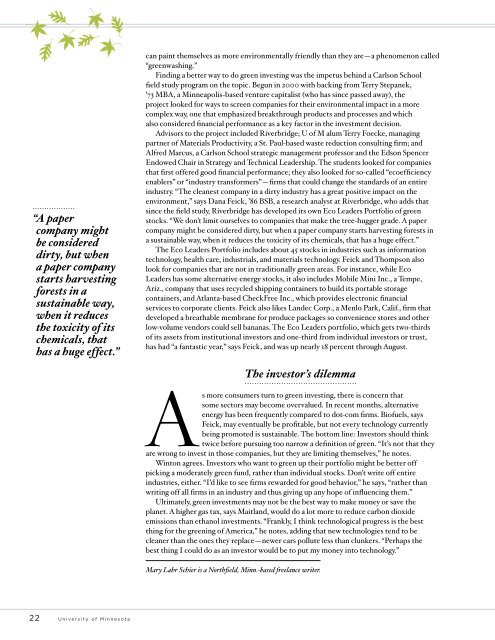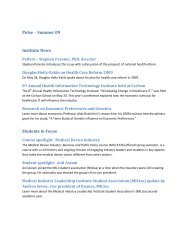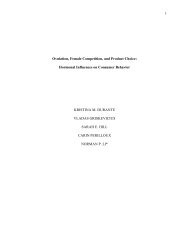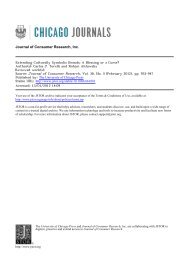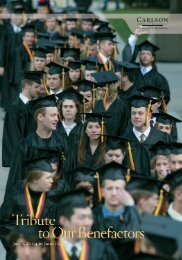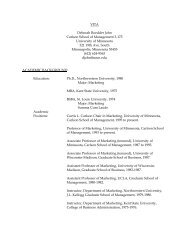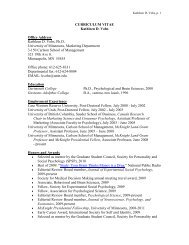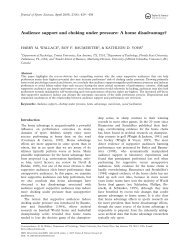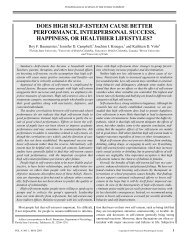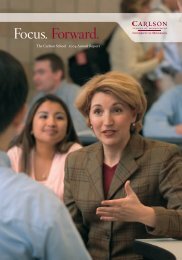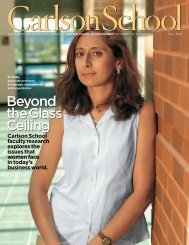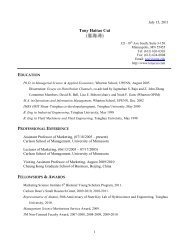Can you make money and save the planet - Carlson School of ...
Can you make money and save the planet - Carlson School of ...
Can you make money and save the planet - Carlson School of ...
You also want an ePaper? Increase the reach of your titles
YUMPU automatically turns print PDFs into web optimized ePapers that Google loves.
;<br />
;<br />
“ A paper<br />
company might<br />
be considered<br />
dirty, but when<br />
a paper company<br />
starts harvesting<br />
forests in a<br />
sustainable way,<br />
when it reduces<br />
<strong>the</strong> toxicity <strong>of</strong> its<br />
chemicals, that<br />
has a huge effect.”<br />
22 University <strong>of</strong> Minnesota<br />
can paint <strong>the</strong>mselves as more environmentally friendly than <strong>the</strong>y are—a phenomenon called<br />
“greenwashing.”<br />
Finding a better way to do green investing was <strong>the</strong> impetus behind a <strong>Carlson</strong> <strong>School</strong><br />
field study program on <strong>the</strong> topic. Begun in 2000 with backing from Terry Stepanek,<br />
’73 MBA, a Minneapolis-based venture capitalist (who has since passed away), <strong>the</strong><br />
project looked for ways to screen companies for <strong>the</strong>ir environmental impact in a more<br />
complex way, one that emphasized breakthrough products <strong>and</strong> processes <strong>and</strong> which<br />
also considered financial performance as a key factor in <strong>the</strong> investment decision.<br />
Advisors to <strong>the</strong> project included Riverbridge; U <strong>of</strong> M alum Terry Foecke, managing<br />
partner <strong>of</strong> Materials Productivity, a St. Paul-based waste reduction consulting firm; <strong>and</strong><br />
Alfred Marcus, a <strong>Carlson</strong> <strong>School</strong> strategic management pr<strong>of</strong>essor <strong>and</strong> <strong>the</strong> Edson Spencer<br />
Endowed Chair in Strategy <strong>and</strong> Technical Leadership. The students looked for companies<br />
that first <strong>of</strong>fered good financial performance; <strong>the</strong>y also looked for so-called “ecoefficiency<br />
enablers” or “industry transformers”—firms that could change <strong>the</strong> st<strong>and</strong>ards <strong>of</strong> an entire<br />
industry. “The cleanest company in a dirty industry has a great positive impact on <strong>the</strong><br />
environment,” says Dana Feick, ’86 BSB, a research analyst at Riverbridge, who adds that<br />
since <strong>the</strong> field study, Riverbridge has developed its own Eco Leaders Portfolio <strong>of</strong> green<br />
stocks. “We don’t limit ourselves to companies that <strong>make</strong> <strong>the</strong> tree-hugger grade. A paper<br />
company might be considered dirty, but when a paper company starts harvesting forests in<br />
a sustainable way, when it reduces <strong>the</strong> toxicity <strong>of</strong> its chemicals, that has a huge effect.”<br />
The Eco Leaders Portfolio includes about 45 stocks in industries such as information<br />
technology, health care, industrials, <strong>and</strong> materials technology. Feick <strong>and</strong> Thompson also<br />
look for companies that are not in traditionally green areas. For instance, while Eco<br />
Leaders has some alternative energy stocks, it also includes Mobile Mini Inc., a Tempe,<br />
Ariz., company that uses recycled shipping containers to build its portable storage<br />
containers, <strong>and</strong> Atlanta-based CheckFree Inc., which provides electronic financial<br />
services to corporate clients. Feick also likes L<strong>and</strong>ec Corp., a Menlo Park, Calif., firm that<br />
developed a breathable membrane for produce packages so convenience stores <strong>and</strong> o<strong>the</strong>r<br />
low-volume vendors could sell bananas. The Eco Leaders portfolio, which gets two-thirds<br />
<strong>of</strong> its assets from institutional investors <strong>and</strong> one-third from individual investors or trust,<br />
has had “a fantastic year,” says Feick, <strong>and</strong> was up nearly 18 percent through August.<br />
The investor’s dilemma<br />
As more consumers turn to green investing, <strong>the</strong>re is concern that<br />
some sectors may become overvalued. In recent months, alternative<br />
energy has been frequently compared to dot-com firms. Bi<strong>of</strong>uels, says<br />
Feick, may eventually be pr<strong>of</strong>itable, but not every technology currently<br />
being promoted is sustainable. The bottom line: Investors should think<br />
twice before pursuing too narrow a definition <strong>of</strong> green. “It’s not that <strong>the</strong>y<br />
are wrong to invest in those companies, but <strong>the</strong>y are limiting <strong>the</strong>mselves,” he notes.<br />
Winton agrees. Investors who want to green up <strong>the</strong>ir portfolio might be better <strong>of</strong>f<br />
picking a moderately green fund, ra<strong>the</strong>r than individual stocks. Don’t write <strong>of</strong>f entire<br />
industries, ei<strong>the</strong>r. “I’d like to see firms rewarded for good behavior,” he says, “ra<strong>the</strong>r than<br />
writing <strong>of</strong>f all firms in an industry <strong>and</strong> thus giving up any hope <strong>of</strong> influencing <strong>the</strong>m.”<br />
Ultimately, green investments may not be <strong>the</strong> best way to <strong>make</strong> <strong>money</strong> or <strong>save</strong> <strong>the</strong><br />
<strong>planet</strong>. A higher gas tax, says Maitl<strong>and</strong>, would do a lot more to reduce carbon dioxide<br />
emissions than ethanol investments. “Frankly, I think technological progress is <strong>the</strong> best<br />
thing for <strong>the</strong> greening <strong>of</strong> America,” he notes, adding that new technologies tend to be<br />
cleaner than <strong>the</strong> ones <strong>the</strong>y replace—newer cars pollute less than clunkers. “Perhaps <strong>the</strong><br />
best thing I could do as an investor would be to put my <strong>money</strong> into technology.”<br />
Mary Lahr Schier is a Northfield, Minn.-based freelance writer.


